The largest group of political parties in the European Parliament has accused the European Commission of helping to organise the lobbying of MEPs in order to get the Nature Restoration Law passed.
The highly controversial law, if passed, would see large swathes of peatland in Ireland and across the EU rewetted, with farm organisations across Europe united in their opposition to the law.
The law has also divided the European Parliament, with the European People’s Party (EPP), of which Fine Gael is a member, withdrawing from negotiations with other MEPs on what form the law should take, or if the parliament should pass it at all.
The law has already been rejected by the parliament’s agriculture committee and fisheries committee. A scheduled vote in its environment committee next week is understood to be too close to call, with the possibility that the law will be rejected there as well.
This may be a precursor to the parliament as a whole rejecting the law in a full session later in the summer.
At an EPP-organised press conference today, the group’s vice-chairperson in charge of environment ,Esther de Lange, and its chief negotiator on nature restoration, Christine Schneider, claimed that the commission was providing resources for businesses to contact MEPs to lobby for a yes vote to the law.
Under EU Law, the only legislative role of the European Commission is to propose legislation, following which the Council of the EU (also known as the council of ministers) and the parliament separately adopt their own positions before negotiating with each other on the final legislative text to be adopted across the EU.
While the commission has a role in mediating negotiations between the council and parliament, it does not itself have an official role in determining the final legislative text after it makes a proposal.
According to the EPP, the commission has “completely overstepped its normal role” by, as the group claimed, trying to influence how MEPs should vote.
Furthermore, the EPP representatives who spoke today claimed that the commission vice-president with responsibility for the European Green Deal (the EU’s flagship environmental programme), Frans Timmermans, has held meetings with some EPP MEPS and told them that, if the party did not back the restoration law, other legislative proposals the EPP deem important may not be forthcoming from the commission.
Speaking today, German MEP Christine Schneider said: “A lot of members of the European Parliament, not only of my political group, have said that Vice-President Timmermans crosses a red line.”
Schneider also claimed that the commission’s Business and Biodiversity Platform was being used to organise the lobbying of MEPs by businesses.
On the commission website, the purpose of this platform is described as to “provide a unique forum for dialogue and policy interface to discuss the links between business and biodiversity at EU level”.
According to Schneider, this platform has provided what she called a “roadmap”, which, she claimed, provides guidance on how to lobby MEPs to vote in favour of the law. She also said that the EPP became aware of this yesterday (Tuesday, June 6).
“This is not the job of the commission. We cannot accept this as a democratic party. We cannot accept this as members of the parliament, because we have been voted [by] our constituencies to make policy here on the European level,” the MEP said.
Schneider added: “It is not the job of the commission to look for a majority in the parliament. It should convince with arguments, and it should bring together council and parliament, but [should not] say to some members of the European Parliament what they should do in the committee and in the plenary [full] session.”
Her colleague, Dutch MEP Esther de Lange, said “I’ve been in the [parliament] for 16 years, I don’t feel easily threatened, but I think the problem here is, in particular, the issue that we have with the lobbying through businesses.
“Members will be contacted by businesses that might be just a food company or any brand that you see in your local supermarket. All of this is coordinated through [the Business and Biodiversity Platform],” she claimed.
“So it looks like the European Commission is financing its own support for this proposal, which I think completely oversteps the normal role of the commission.”
“We take this extremely seriously. We are looking into this,” de Lange added.
